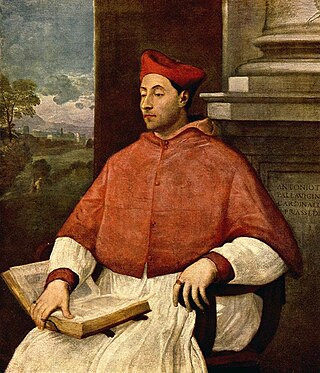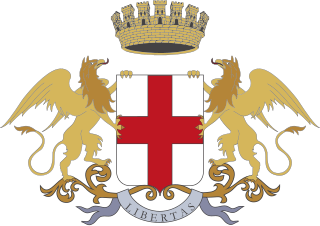Oberto or Otbert may refer to:
The margraviate or marquisate of Bodonitsa, today Mendenitsa, Phthiotis, was a Frankish state in Greece following the conquests of the Fourth Crusade. It was originally granted as a margravial holding of Guy Pallavicini by Boniface, first king of Thessalonica, in 1204. Its original purpose was to guard the pass of Thermopylae.
Francis Zorzi (1337–1388), called Marchesotto, was a member of the Venetian Zorzi family and the Marquess of Bodonitsa in Central Greece from 1345 to his death.
Nicholas ΙΙΙ Zorzi or Giorgi was the Marquess of Bodonitsa, a member of the Zorzi family of the Republic of Venice, from 1416 to 1436, though the title was purely nominal by then. Before becoming marquess in an exchange with his nephew Nicholas II, he was the baron of Carystus. He was a son of Guglielma Pallavicini and Marquess Nicholas I Zorzi.
Guy or Guido Pallavicini, called Marchesopoulo by his Greek subjects, was the first marquess of Bodonitsa in Frankish Greece from 1204 to his death in or shortly after 1237. He was one of the most important Frankish rulers in Greece, and played a major role in the short-lived Kingdom of Thessalonica: in 1208–1209 he supported the Lombard rebellion against King Demetrius of Montferrat, but by 1221 he was the kingdom's regent (bailli), and was left to defend the city against the ruler of Epirus, Theodore Komnenos Doukas. Left unsupported by the Latin Empire, and with a projected crusade to relieve the city delayed, he surrendered the city in December 1224. The belated arrival of the crusade helped to save his own fief from falling to the Epirotes, however, and he was soon able to return there, dying on or shortly after 1237.
Isabella Pallavicini, sometimes Jezebel, was sovereign marchioness of Bodonitsa from 1278 to 1286.
The House of Obertenghi were a prominent Italian noble family of Longobard origin descended from Viscount Adalbert III, first Margrave of Milan.
Thomas Pallavicini was the marquess of Bodonitsa following a disputed succession in 1286. He was the grandson of Rubino, younger brother of Guy, the first margrave.
Albert Pallavicini was the fifth marquess of Bodonitsa from his father's death until his own in 1311. His father was Thomas, a great-nephew of the first marquess, Guy. Albert married Maria dalle Carceri, a Venetian noblewoman from Euboea. He even obtained a sixth of that island.
Andrea Cornaro of the House of Cornaro, was a Venetian citizen from Crete, and baron of Scarpanto. He was the husband of Maria dalle Carceri, heiress of a sixth of Euboea and widow of Albert Pallavicini, and co-governed her half of the marquisate of Bodonitsa until his death.

Guglielma Pallavicini, the Lady of Thermopylae, was the last Pallavicino heir to rule in Bodonitsa, in Frankish Greece.
The March of Genoa or Eastern Liguria was created in 961 by Holy Roman Emperor Otto I.

Antonio Gentile Pallavicini was an Italian Cardinal. He was considered papabile in 1492. Bishop of Frascati from April until December 1503; later bishop of Palestrina.
Uberto is an Italian first name, the equivalent of Hubert; variations include Oberto, Ubertino and female forms are Uberta, Oberta, Ubertina.

Mendenitsa, in the Middle Ages known as Mountonitsa (Μουντονίτσα) and Bodonitsa, Boudonitsa, or Vodonitsa (Βοδονίτσα), is a village in Phthiotis, Greece. Along with the nearby village of Karavidia, it forms a community in the municipal unit of Molos.

The House of Malaspina was a noble Italian family of Longobard origin that descended from Boniface I, through the Obertenghi line, that ruled Lunigiana from the 13th to the 14th centuries, and the marquisate of Massa and lordship of Carrara since the 14th century.

Lazzaro Pallavicini or Pallavicino was a cardinal of the Catholic Church starting on 19 May 1670.
Adalberto the Margrave, also known as "il Margravio" or "Adalberto III" was an Italian nobleman tied with the Obertenghi family and a well-known ancestor to the Este, Pallavicini and Malaspina family.

The Ceva Grimaldi are an Italian noble family established in Southern Italy since the 16th century but whose origins are in Piedmont and Liguria and date back to the 10th century. The main titles associated with this branch of the Ceva family are Marchese di Pietracatella and Duca di Telese.

Gian Carlo Pallavicino was the 179th Doge of the Republic of Genoa.











